Find Help
More Items From Ergsy search
-

Anorexia nervosa | NHS
Relevance: 100%
-
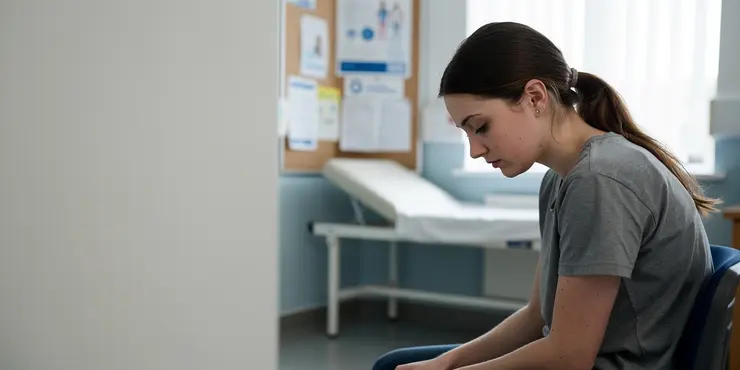
Anorexia nervosa | NHS
Relevance: 99%
-
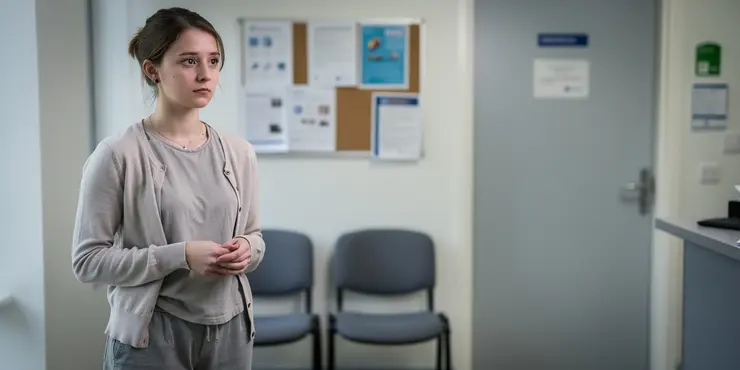
Anorexia: Katie's story | NHS
Relevance: 97%
-
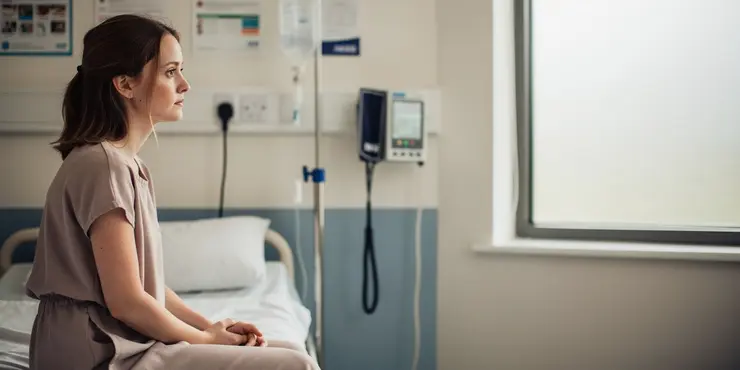
Anorexia: Katie's story | NHS
Relevance: 97%
-
What are the main types of eating disorders?
Relevance: 37%
-
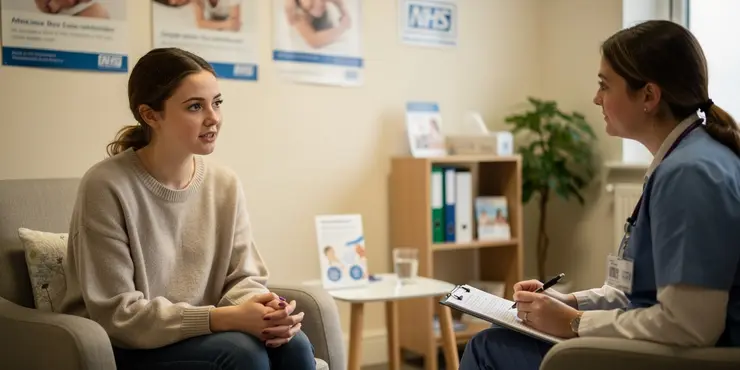
What is the impact of eating disorders on physical health?
Relevance: 35%
-
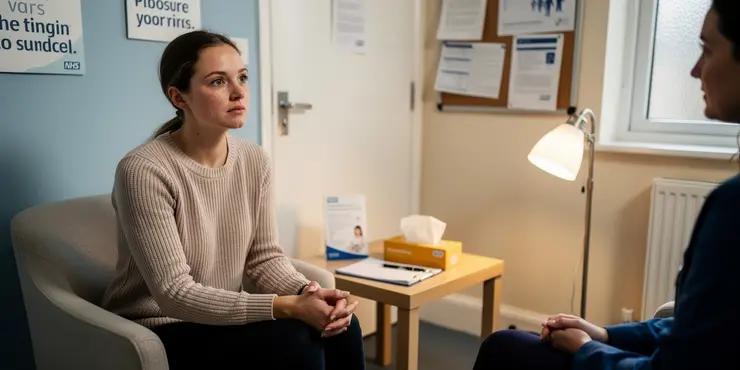
How do eating disorders affect mental health?
Relevance: 28%
-
What is an eating disorder?
Relevance: 27%
-
What are the long-term effects of untreated eating disorders?
Relevance: 25%
-
How are eating disorders diagnosed?
Relevance: 22%
-
Can eating disorders be treated?
Relevance: 22%
-

Eating disorders: treatment
Relevance: 20%
-
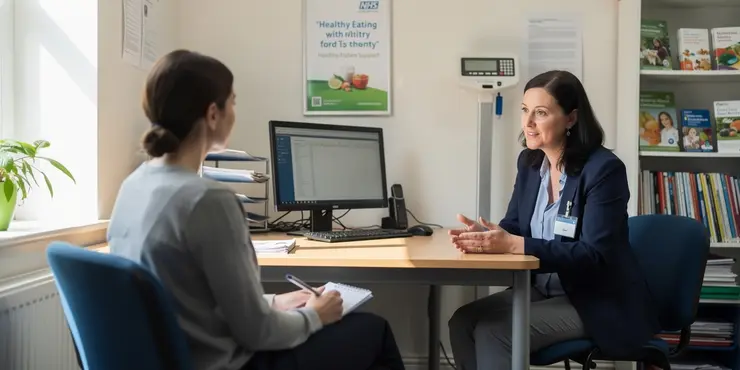
Jess Rann - Specialist Eating Disorders Dietitian
Relevance: 19%
-
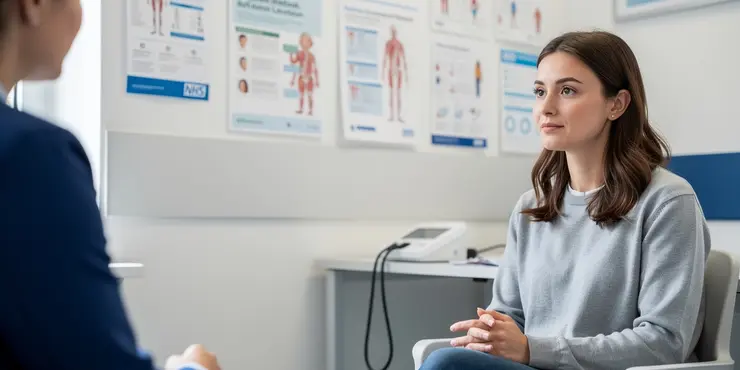
The treatment approach for an eating disorder
Relevance: 19%
-
What is body dysmorphia and how is it related to eating disorders?
Relevance: 18%
-
What is an Eating Disorder?
Relevance: 18%
-
Is it possible to recover from an eating disorder?
Relevance: 14%
-
Can eating disorders occur with other mental health conditions?
Relevance: 13%
-
How can someone help a loved one with an eating disorder?
Relevance: 13%
-
What are common symptoms of eating disorders?
Relevance: 13%
-
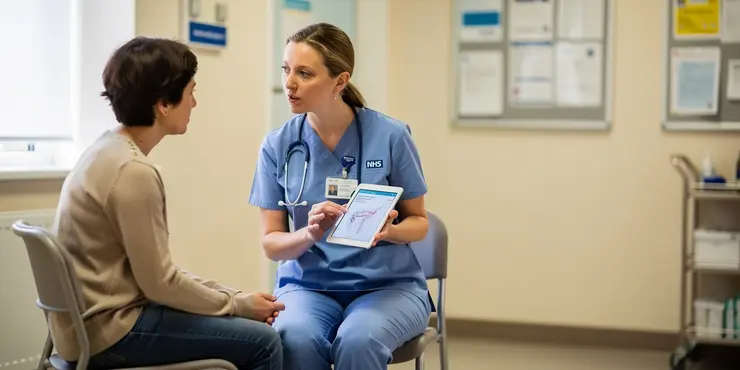
Are there any medical conditions that disqualify someone from using weight loss jabs?
Relevance: 13%
-
What is the role of therapy in treating eating disorders?
Relevance: 12%
-
Who is at risk for developing an eating disorder?
Relevance: 12%
-
Are eating disorders only about food?
Relevance: 12%
-
Are there preventative measures for eating disorders?
Relevance: 12%
Anorexia: Katie's Story | NHS
Introduction to Anorexia
Anorexia nervosa, commonly known as anorexia, is a serious mental health condition characterized by an obsessive desire to lose weight by refusing to eat. The condition affects both physical and mental health, often leading to severe nutritional deficiencies, and if left untreated, it can be life-threatening. This story focuses on Katie, a young woman from the United Kingdom, who struggled with anorexia and found help through the National Health Service (NHS).Katie's Battle with Anorexia
Katie's journey with anorexia began during her teenage years. Influenced by societal pressures and an intense fear of gaining weight, she started restricting her food intake and excessively exercising. What began as a seemingly harmless diet spiraled into a relentless pursuit of thinness, causing her to lose a significant amount of weight. Her friends and family grew increasingly concerned as Katie's health deteriorated.Recognition and Diagnosis
Katie's realization of her condition came after a routine check-up at her GP's office where she was diagnosed with anorexia nervosa. The diagnosis was a critical turning point, providing a label to her struggles and paving the way for appropriate medical intervention. Understanding that anorexia is not just about food, but deeply rooted in psychological issues, Katie was referred to specialists within the NHS for a comprehensive treatment plan.Treatment and Support from the NHS
Katie's treatment involved a multi-disciplinary approach including dietitians, psychologists, and medical doctors. Cognitive behavioural therapy (CBT) was a significant part of her recovery, helping her to challenge and change unhealthy thought patterns about body image and food. Additionally, she participated in group therapy sessions which provided a supportive community of others going through similar experiences. The NHS also supported her family, educating them on how to assist Katie in her recovery process.Katie's Recovery Journey
Recovery from anorexia is often a long and challenging journey, but Katie's determination, combined with the support of her healthcare team and loved ones, allowed her to make significant strides. Gradually, she started to recognize and combat the distorted thoughts about her body. Over time, Katie regained her physical health and began embracing a healthier relationship with food and her body.Conclusion
Katie's story highlights the importance of seeking help and the vital role that the NHS can play in the treatment of anorexia. Early intervention, comprehensive care, and continual support are crucial in the fight against this debilitating condition. For anyone struggling with eating disorders, reaching out for professional help is the first step towards recovery. This HTML document presents Katie's fight with anorexia underlined with key information regarding the condition, diagnosis, treatment, and the recovery journey, specifically focusing on the NHS's role in supporting individuals in the United Kingdom.Anorexia: Katie's Story | NHS
Introduction to Anorexia
Anorexia is a serious health problem where people really want to lose weight and stop eating. It can make people very sick and, if not treated, it can be very dangerous. This story is about Katie, a young woman from the UK, who had anorexia and got help from the National Health Service (NHS).Katie's Battle with Anorexia
Katie started having problems with anorexia when she was a teenager. She was worried about getting fat and started eating less and exercising a lot. What started as a small diet turned into a big problem. Katie lost a lot of weight, and her friends and family became very worried about her health.Recognition and Diagnosis
Katie found out she had anorexia after a regular visit to her doctor. The doctor said she had anorexia nervosa. This was an important moment for Katie because she knew what was happening and could start to get help. The doctor knew that anorexia is not just about food; it's also about how a person feels and thinks. Katie was sent to get special help from the NHS.Treatment and Support from the NHS
Katie got help from a team of people, like dietitians, psychologists, and doctors. They used a special type of talk therapy called cognitive behavioural therapy (CBT) to help Katie change the way she thought about her body and food. Katie also joined group therapy, where she met others like her. The NHS helped her family too, teaching them how to support Katie.Katie's Recovery Journey
Getting better from anorexia takes time, but Katie was strong and had help from her doctors and family. Slowly, she started to fight the bad thoughts about her body. Over time, her health got better, and she learned to have a better relationship with food and her body.Conclusion
Katie's story shows how important it is to ask for help and how the NHS can help with anorexia. Getting help early and having a team of caring people is very important. If someone is having trouble with eating, asking a doctor for help is the first step to getting better. This document tells Katie's story and explains more about anorexia, how it can be recognized and treated, and the role the NHS plays in helping people in the UK.Frequently Asked Questions
What is anorexia?
Anorexia is an eating disorder characterized by an intense fear of gaining weight, a distorted body image, and restricted food intake leading to significant weight loss.
How did Katie's anorexia begin?
Katie's anorexia began when she felt pressure to lose weight and be thin. It started with skipping meals and excessive exercise.
What are common signs of anorexia?
Common signs include severe weight loss, obsession with calories and dieting, food avoidance, excessive exercise, and distorted body image.
How did Katie's anorexia impact her life?
Katie's anorexia affected her physically and mentally, leading to severe weight loss, isolation, depression, and loss of interest in activities she once enjoyed.
What prompted Katie to seek help?
Katie sought help after realizing the physical toll anorexia was taking on her body and the concern expressed by her family and friends.
Where can one seek help for anorexia in the UK?
Help for anorexia can be sought through the NHS, local eating disorder services, and organizations like Beat, a leading UK eating disorder charity.
What treatment options are available for anorexia?
Treatment options include psychotherapy, nutritional counseling, medical monitoring, and sometimes medication to address underlying mental health conditions.
How important is family support in anorexia recovery?
Family support is crucial in recovery as it provides emotional backing, understanding, and encouragement to the individual during their treatment journey.
How long does recovery from anorexia take?
Recovery time varies for each individual and can take months to years, requiring ongoing support and treatment to manage and overcome the disorder.
What role does therapy play in anorexia treatment?
Therapy, such as cognitive-behavioral therapy (CBT), helps individuals address the underlying emotional issues, develop healthier eating behaviors, and improve their self-esteem.
Can anorexia lead to other health complications?
Yes, anorexia can lead to severe health complications such as heart issues, bone loss, infertility, digestive problems, and even death if untreated.
How did Katie cope with the challenges of recovery?
Katie coped with recovery challenges by seeking professional help, receiving support from her family, and gradually rebuilding her relationship with food and her body.
Is it possible to fully recover from anorexia?
Yes, many individuals fully recover from anorexia with the appropriate treatment and support, although it requires commitment and patience.
What can friends and family do to help someone with anorexia?
Friends and family can help by providing a supportive environment, avoiding judgmental comments about food and weight, and encouraging the person to seek professional help.
Are there any support groups for individuals with anorexia in the UK?
Yes, there are several support groups and resources available through organizations such as Beat, which provide support for individuals with anorexia and their families.
What is anorexia?
Anorexia is when someone does not eat enough food because they worry a lot about their weight or looks. They might feel they are too fat even if they are very thin. This can make them very sick.
To help understand better, you can:
- Look at pictures that show what happens when someone has anorexia.
- Ask a grown-up to explain it in a simple way.
- Watch a short video that talks about eating healthy foods.
Anorexia is a health problem with eating. People with anorexia worry a lot about getting fat. They see their body differently, not like it really is. They eat very little food, and this makes them lose a lot of weight.
For help, talk to a doctor. Using picture books or videos can explain things better. Talking with friends and family can help, too.
How did Katie's eating problem start?
Katie got sick because she wanted to be really thin. She felt like she had to lose weight. So, she started not eating meals and doing too much exercise.
What are common signs of anorexia?
Here are some signs of anorexia:
- Not eating enough food.
- Being very skinny.
- Worrying too much about weight.
- Exercising too much.
- Feeling tired or sick.
- Hair falling out.
- Feeling very cold.
It’s important to talk to someone who can help, like a doctor or a teacher.
Here are some signs to look for:
- Big weight loss.
- Worrying a lot about calories and diets.
- Not wanting to eat certain foods.
- Exercising too much.
- Not seeing their body the way it really is.
Helpful tools and techniques:
- Use a feelings chart to talk about emotions.
- Try to eat together as a family.
- Talk to a teacher or a doctor if you are worried.
How did Katie's anorexia affect her life?
Anorexia is a sickness where people eat very little because they worry a lot about their weight. It can make someone very sick.
Here is how anorexia affected Katie's life:
- Katie felt very tired all the time.
- She found it hard to concentrate at school.
- Katie lost a lot of weight and felt weak.
- She did not feel happy and often felt sad.
Here are some things that can help:
- Talk to a doctor or a nurse.
- Spend time with friends and family who can give support.
- Read or listen to simple stories about other people's experiences.
- Try to eat small meals and snacks to gain strength.
Katie got very sick because she had anorexia. Anorexia is when people eat too little because they worry too much about their weight. Katie became very thin and was often sad. She stopped doing fun things she used to like. She also felt alone.
If you want help, you can talk to someone you trust. Drawing pictures or writing in a journal can also help you feel better. Listening to calm music might make you feel happy and relaxed.
Why did Katie ask for help?
Katie got help because she realized that anorexia was hurting her body. Her family and friends were also worried about her.
Where can you find help for anorexia in the UK?
If you need help for anorexia, you can:
- Go to your doctor. They can talk to you and help.
- Call a support line. They are there to listen.
- Tell a trusted person. Share your feelings with someone you trust.
Remember, it is okay to ask for help.
You can get help for anorexia from the NHS. There are also local services that help people with eating problems. A charity called Beat can help too. Beat is a big organization in the UK that helps people with eating disorders.
What are the treatments for anorexia?
Anorexia is when people don’t eat enough because they worry about their weight. Here are some ways to help:
- Talking to a Doctor: A doctor can help find the best treatment.
- Therapy: Talking to a therapist can help with feelings and eating habits.
- Nutrition Support: A dietitian can help plan healthy meals.
- Support Groups: Meeting others with similar struggles can be comforting.
- Medicine: Sometimes, medicine can help feel better.
Remember, getting help is good and there are people who care and want to help.
To help you feel better, you can try talking to a counselor, learning about healthy eating, seeing a doctor to check your health, and sometimes taking medicine if you need it.
Why is family help important when getting better from anorexia?
When someone has anorexia, getting help from family can make a big difference. Family can show love and understanding. They can help the person eat and feel better.
Family can learn about anorexia to know how to help. Talking kindly and listening are good ways to help too.
Using tools like drawing feelings or writing in a diary can also help. Families can go to support groups to learn more.
Family help is really important when someone is getting better. It gives love, understanding, and cheers them on while they get better.
How long does it take to get better from anorexia?
Getting better from anorexia can take a while. It is different for everyone. Some people take a few months, while others might take years. It is important to get help from doctors and therapists. They can help you feel better.
Here are some ways to help:
- Talk to a doctor or therapist.
- Join a support group.
- Spend time with family and friends.
- Be patient with yourself.
Getting better can be different for everyone. It might take a few months or even a few years. You will need help and care all the way to feel better and beat the problem.
How does talking to a therapist help when someone has anorexia?
Talking to a therapist helps people with anorexia. A therapist is someone who listens and gives support. They help people understand their feelings. Therapists also help them find ways to get better.
If you have anorexia, talking to a therapist can help you feel less alone. It is important to talk about how you feel.
Some helpful things to do might be:
- Write down your feelings in a diary. This can help you understand what you are thinking.
- Draw pictures to show how you feel. Sometimes it's easier than talking.
- Use apps or tools that help you remember to eat healthy food.
Talking with a therapist can help. This is called therapy. One kind of therapy is called CBT. In CBT, people learn to feel better inside, eat in a healthy way, and like themselves more.
Can having anorexia cause more health problems?
Having anorexia can make you very sick. It can cause more problems with your body. If you do not eat enough, your body does not get what it needs to stay healthy.
Here are some things that can happen if you have anorexia:
- Your bones can become weak.
- Your heart can have trouble working.
- You might feel very tired all the time.
- You can have trouble with your stomach.
It is important to talk to a doctor if you think you have anorexia. They can help you feel better.
Helpful tips:
- Use pictures to help remember information.
- Listen to an audio version if reading is hard.
- Ask someone you trust to explain things.
Yes, anorexia can make you very sick. It can hurt your heart, make your bones weak, stop you from having babies, cause tummy problems, and if not treated, it can be very dangerous.
How did Katie get better and deal with problems?
Katie got better by talking to a doctor. Her family helped her too. She learned to eat better and feel good about her body again.
Can someone get better from anorexia completely?
Yes, many people do get better from anorexia. They need the right help and support. It takes time and effort.
How can friends and family help someone who has anorexia?
Friends and family can play a big role in helping someone with anorexia feel better. Here are some simple things they can do:
- Listen: Be there to listen when they want to talk. Show them you care.
- Encourage: Support them to get help from a doctor or therapist.
- Learn: Read about anorexia to understand what they are going through.
- Be patient: Getting better takes time. Be patient and stay by their side.
- Offer company: Do fun activities together like walking or watching a movie.
Using tools like books, online support groups, or talking to a counselor can also be helpful. Remind them they are not alone and it is good to ask for help.
Friends and family can help a lot! They can be nice and supportive, not say mean things about food or weight, and help the person talk to a doctor or therapist.
Is there any help for people with anorexia in the UK?
If you or someone you know has anorexia, there are groups in the UK that can help. These groups are like clubs where people talk and help each other.
Some things these groups can do:
- Let you meet other people who feel the same way.
- Give you advice and support.
- Help you feel better.
You can use these things for extra help:
- Talk to a doctor or a nurse.
- Call a helpline for support over the phone.
- Ask an adult you trust for help.
Yes, there are groups and places that can help you. Beat is one of them. They help people with anorexia and their families.
Useful Links
This website offers general information and is not a substitute for professional advice.
Always seek guidance from qualified professionals.
If you have any medical concerns or need urgent help, contact a healthcare professional or emergency services immediately.
Some of this content was generated with AI assistance. We’ve done our best to keep it accurate, helpful, and human-friendly.
- Ergsy carfully checks the information in the videos we provide here.
- Videos shown by Youtube after a video has completed, have NOT been reviewed by ERGSY.
- To view, click the arrow in centre of video.
- Most of the videos you find here will have subtitles and/or closed captions available.
- You may need to turn these on, and choose your preferred language.
- Go to the video you'd like to watch.
- If closed captions (CC) are available, settings will be visible on the bottom right of the video player.
- To turn on Captions, click settings .
- To turn off Captions, click settings again.
More Items From Ergsy search
-

Anorexia nervosa | NHS
Relevance: 100%
-

Anorexia nervosa | NHS
Relevance: 99%
-

Anorexia: Katie's story | NHS
Relevance: 97%
-

Anorexia: Katie's story | NHS
Relevance: 97%
-
What are the main types of eating disorders?
Relevance: 37%
-

What is the impact of eating disorders on physical health?
Relevance: 35%
-

How do eating disorders affect mental health?
Relevance: 28%
-
What is an eating disorder?
Relevance: 27%
-
What are the long-term effects of untreated eating disorders?
Relevance: 25%
-
How are eating disorders diagnosed?
Relevance: 22%
-
Can eating disorders be treated?
Relevance: 22%
-

Eating disorders: treatment
Relevance: 20%
-

Jess Rann - Specialist Eating Disorders Dietitian
Relevance: 19%
-

The treatment approach for an eating disorder
Relevance: 19%
-
What is body dysmorphia and how is it related to eating disorders?
Relevance: 18%
-
What is an Eating Disorder?
Relevance: 18%
-
Is it possible to recover from an eating disorder?
Relevance: 14%
-
Can eating disorders occur with other mental health conditions?
Relevance: 13%
-
How can someone help a loved one with an eating disorder?
Relevance: 13%
-
What are common symptoms of eating disorders?
Relevance: 13%
-

Are there any medical conditions that disqualify someone from using weight loss jabs?
Relevance: 13%
-
What is the role of therapy in treating eating disorders?
Relevance: 12%
-
Who is at risk for developing an eating disorder?
Relevance: 12%
-
Are eating disorders only about food?
Relevance: 12%
-
Are there preventative measures for eating disorders?
Relevance: 12%


